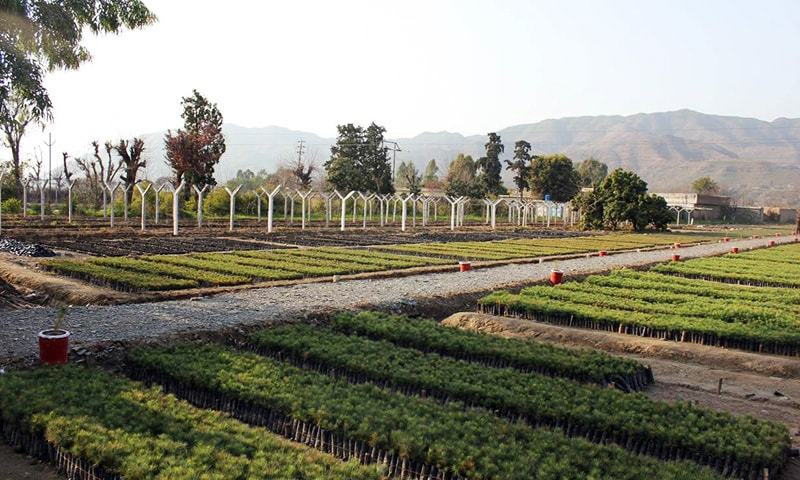ISLAMABAD —
Pakistan’s northwestern province, Khyber Pakhtunkhaw (KPK), has planted an unprecedented 1 billion trees in just more than two years and surpassed an international commitment of restoring 350,000 hectares of forests and degraded land.
The massive effort aims to turn the tide on land degradation and loss in the mountainous, formerly forested KPK, which lies in the Hindu Kush mountain range.
Imran Khan, head of the Pakistan Tehreek-e-Insaf (PTI) party governing the province, launched the reforestation campaign, dubbed “Billion Tree Tsunami,” in 2015.
Pictures of a river bank before and after the Billion Tree Tsunami campaign.
Goal reached early
The cricket-star-turned politician revealed to VOA that the goal of adding 1 billion trees by planting and natural regeneration has been achieved this month, well ahead of the original deadline of December 2017.
He says his party plans to organize a special event in Islamabad in late August to celebrate the successful completion of the project, and experts as well as foreign diplomats will be invited.
“We will show them by coordinates, on Google map you can go and see where these trees have been planted, 1 billion trees, this is now the model for the rest of Pakistan,” Khan said.
Punjab, Sindh, Khyber-Pakhtunkhwa and Balochistan provinces, Pakistan
High deforestation rate
Pakistan is seventh on the list of the countries mostly likely to be affected by global warming and has one of the highest deforestation rates in Asia. Decades of tree felling have reduced the country’s forests to less than 3 percent of its land area. About 40 percent of the remaining forests are in KPK.
Khan hopes his reforestation drive will decrease the effects of global warming and natural disasters like floods that cause devastation in KPK and elsewhere in Pakistan every year.
“If you plant trees, we have discovered, by the river banks it sustains the rivers. But most importantly, the glaciers that are melting in the mountains, and one of the biggest reasons is because there has been a massive deforestation. So, this billion tree is very significant for our future,” Khan said.
Bonn Challenge
The International Union for Conservation of Nature (IUCN) in a statement Friday congratulated the Pakistani province on reaching the “momentous milestone.”
“This marks the first Bonn Challenge pledge to reach its restoration goal,” the organization noted.
The Bonn Challenge, set up in 2011, calls for the restoration of 150 million hectares of deforested and degraded lands by 2020, and 350 million hectares by 2030.
More than 20 countries have so far responded to the challenge, expressing an ambition to restore more than 60 million hectors by 2020 with more commitments expected.
KPK’s reforestation campaign made it the only province or subnational entity to be included in the Bonn Challenge.
“The Billion Tree Tsunami initiative is a true conservation success story, one that further demonstrates Pakistan’s leadership role in the international restoration effort and continued commitment to the Bonn Challenge,” acknowledged Inger Anderson, director general of IUCN.
Nurseries produce 25,000 saplings
Provincial officials say the campaign has achieved its restoration target through a combination of protected natural regeneration, 60 percent, and planned afforestation, 40 percent.
Many small-scale nurseries, producing up to 25,000 saplings each, have been set up with cash advances and a guaranteed purchase agreement from the provincial government.
The KPK government has invested $123 million to help establish 13,000 private tree nurseries in almost every district of the province, producing hundreds of thousands of saplings of local and imported tree varieties, including pines, walnuts and eucalyptus, officials say.
Local economies benefit
This has boosted local incomes, generated thousands of green jobs, and empowered unemployed youth and women in the province. An additional $100 million will be allocated to maintain the project through June 2020.
“This support makes the project one of the largest eco-investments ever made in Pakistan,” according to the IUCN.
It noted the newly planted trees are reinforcing riverbanks and add tree resources to agricultural lands engaged in farm forestry. They also improve biodiversity by restoring wildlife shelters and contribute to CO2 sequestration through new tree plantations.
“But we could not have done it if the local communities were not involved,” Khan said. “The local communities first grew the nurseries and then amongst them people who then protected the trees, the saplings when they were planted. It is one of the most successful experiments ever, and we have 85 percent survival rate.”
Experts at World Wildlife Fund-Pakistan, which is monitoring and auditing the tree-planting effort in KPK, say the project has been an environmental, economic and social success, with one of the highest survival rates of trees in the world, ranging from 70 to 90 percent.
“If the trend continues, there will be more birds, there will be more microbes, there will be more insects, so there will be more animals, so more habitats. The ecosystem will kind of literally revive in certain places. There will be more rains because we do need rains,” Hamaad Khan Naqi, WWF-Pakistan’s director general, told VOA.
PTI’s Khan says the provincial government has enforced a complete ban on the cutting and felling of trees in reserved forests across KPK.
Authorities have also curtailed activities of the powerful “timber mafia” by dismantling hundreds of illegal sawmills and arresting timber cutters.
At least two forest guards have been killed in such encounters while many braved injuries, Khan said.
The popularity and recognition of the provincial initiative has encouraged the central government last year to announce its own “Green Pakistan” program, with a goal to plant more than 100 million trees in the next five years.
VOA




what an achievement



Kudos to KPK gov and IK!!! he kept his promise.
@Zibago @django @Hell hound @Moonlight @Arsalan @Imad.Khan








































































